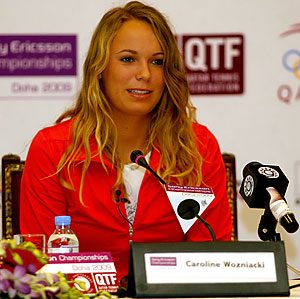
Wozniacki 'scandal' should serve as end to on-court coaching
1. For years, many of you have joined me in begging the WTA to euthanize the failed experiment that is "on-court coaching." We may finally get our wish. Though not without the usual whiff of drama.
Playing in Luxembourg last week, Caroline Wozniacki was a few games from beating Anne Kremer in a first-round match. However, an injury was going to prevent Wozniacki from playing her next match. During a changeover, Wozniacki's father/coach instructed her to retire before winning outright -- good form, particularly since Kremer is from Luxembourg.
All good, right? Problem was, he said this in Polish during a changeover and, thanks to on-court coaching, microphones picked up the discourse. Armed with this information, online gamblers quickly bet on Kremer, who did in fact advance when Wozniacki retired leading 7-5, 5-0. The anti-integrity cops were summoned and suddenly this was a big story.
Maybe a gambler can explain this to me: What's the problem? Aren't gamblers always looking for an incremental edge, a piece of information that tips the odds in their favor? There was no "inside information," since anyone watching the match was privy to the dad's instructions. So long as neither Wozniacki nor her father was complicit -- and there's no indication they were -- why is this any different from an attentive viewer noticing a player limping or changing her strings and betting accordingly? Lastly, how did the WTA not anticipate that coaches wired for sound during matches might impart information relevant to gamblers?
Whatever, this "scandal" was the dominant tennis news this week. If the upshot is the WTA finally gives the heave-ho to on-court coaching, that's great. Too bad it wasn't before one of the more marketable young stars had to defend her honor when, it appears, she did nothing wrong.
2. Roger Federer didn't play last week. Rafael Nadal, Andy Roddick, the Williams sisters and Andy Murray also were absent. Still, there were four tour-level events -- and the highly regarded Calabasas challenger -- held last week. Which meant that rank-and-file players were afforded an opportunity to earn both major coin and major rankings points.
The honor roll: a resurgent Marcos Baghdatis won in Stockholm (the rare event beset by a prostitution scandal) for his first title in nearly three years. Mikhail Youzhny won in Moscow. Timea Bacsinszky of Switzerland -- about time the Swiss produced a decent player -- was a surprise champion in Luxembourg, while Francesca Schiavone took the women's crown in Moscow.
We hear it all the time: "How the heck could player X possibly be ranked so high when I've barely heard of them?" Here's answer: They take advantage of the fields and win in the fall.
3. Not to get all High Fidelity on you here ... but I'm writing this from my coffee joint and they're playing some Fleetwood Mac album. (Rumours? A greatest hits compilation? Whatever.) A few minutes ago, we just heard Never Going Back Again. Short and sweet. Nice guitar riff. Borderline classic. The very next song is Little Lies, which is just awful. ("No more broken hearts/We're better off apart.") We're talking sub-junk here. When this song comes on the radio, you switch stations as instinctively as you withdraw your hand from a flame.
A larger point: We wonder how Roddick can come within a few points of winning Wimbledon, and then lose to Lukasz Kubot? How can Serena Williams win three majors in the last 14 months but no other tournaments? But athletes don't have a monopoly on uneven performances. The capacity for both the exceptional and exceptionally awful -- maddening as it can be -- exists in all of us.




